Cultural and HRM Issues for UK Companies in Locating Call Centre in Japan
VerifiedAdded on 2023/06/05
|11
|3443
|397
AI Summary
This report discusses the cultural and HRM issues that UK companies need to consider when locating a call centre operation in Japan. It covers the advantages and barriers faced by the company to internationalize their business, along with recommendations to overcome the barriers of international expansion. The report also includes Hofstede's cultural dimensions theory to understand the cultural differences between the UK and Japan.
Contribute Materials
Your contribution can guide someone’s learning journey. Share your
documents today.

BMP6003
Secure Best Marks with AI Grader
Need help grading? Try our AI Grader for instant feedback on your assignments.
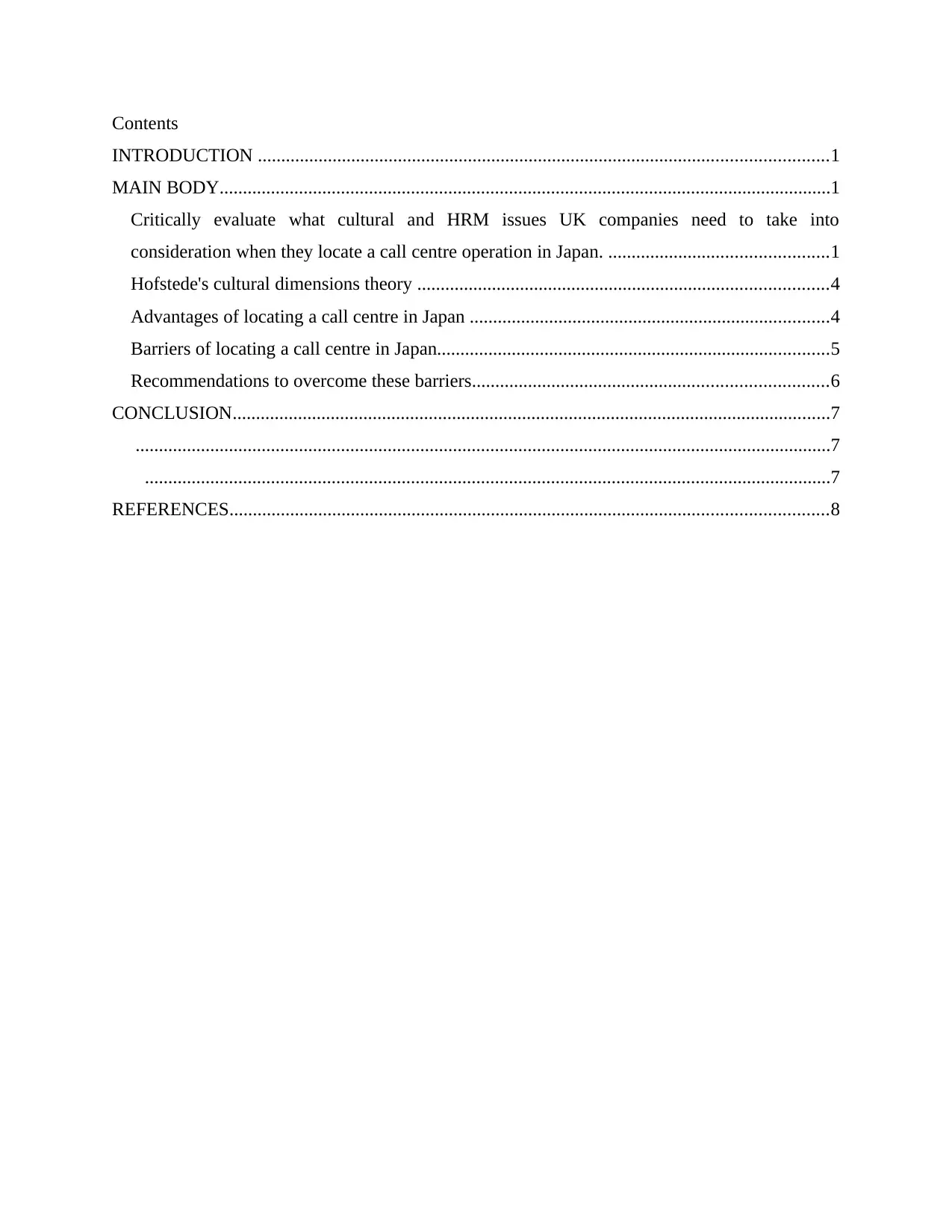
Contents
INTRODUCTION ..........................................................................................................................1
MAIN BODY...................................................................................................................................1
Critically evaluate what cultural and HRM issues UK companies need to take into
consideration when they locate a call centre operation in Japan. ...............................................1
Hofstede's cultural dimensions theory ........................................................................................4
Advantages of locating a call centre in Japan .............................................................................4
Barriers of locating a call centre in Japan....................................................................................5
Recommendations to overcome these barriers............................................................................6
CONCLUSION................................................................................................................................7
.....................................................................................................................................................7
...................................................................................................................................................7
REFERENCES................................................................................................................................8
INTRODUCTION ..........................................................................................................................1
MAIN BODY...................................................................................................................................1
Critically evaluate what cultural and HRM issues UK companies need to take into
consideration when they locate a call centre operation in Japan. ...............................................1
Hofstede's cultural dimensions theory ........................................................................................4
Advantages of locating a call centre in Japan .............................................................................4
Barriers of locating a call centre in Japan....................................................................................5
Recommendations to overcome these barriers............................................................................6
CONCLUSION................................................................................................................................7
.....................................................................................................................................................7
...................................................................................................................................................7
REFERENCES................................................................................................................................8

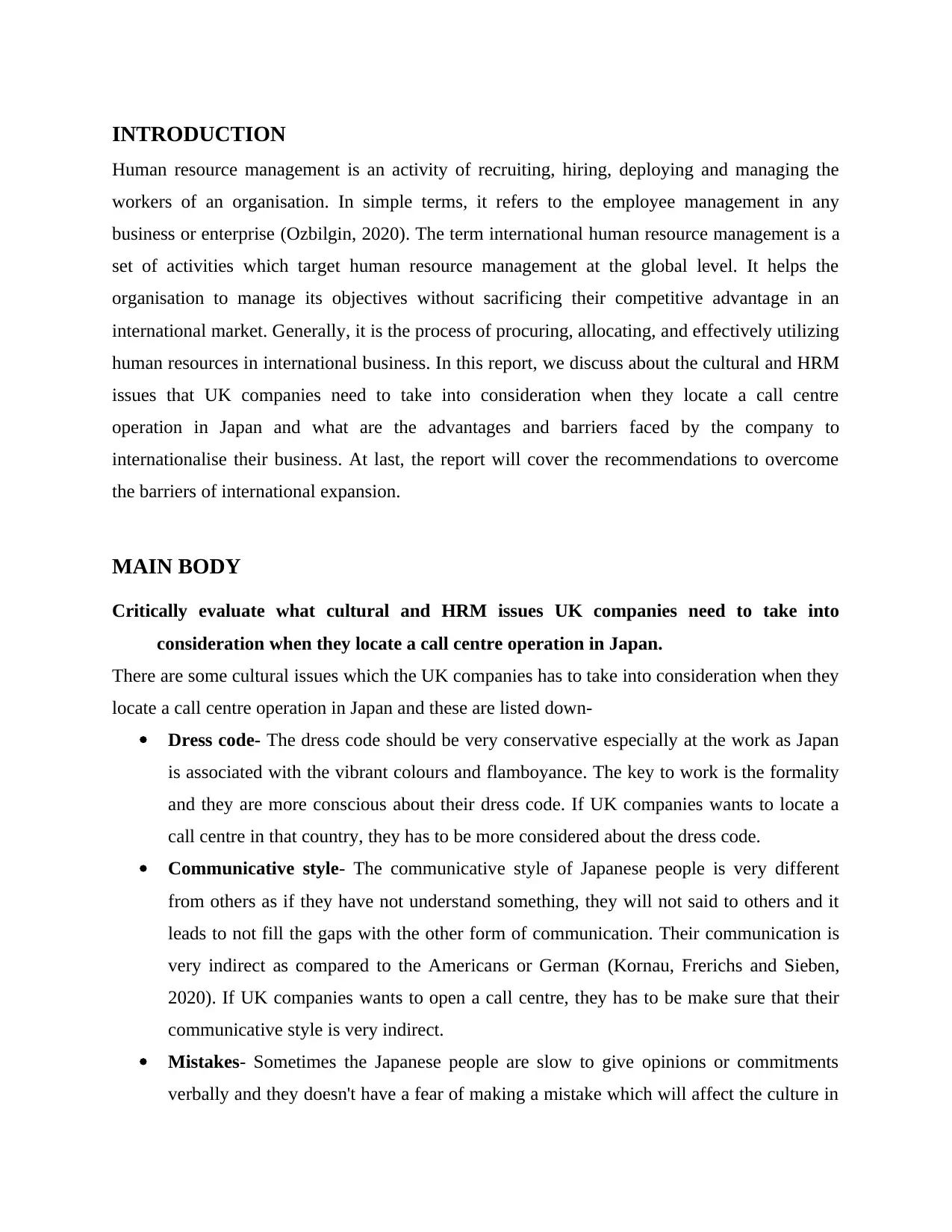
INTRODUCTION
Human resource management is an activity of recruiting, hiring, deploying and managing the
workers of an organisation. In simple terms, it refers to the employee management in any
business or enterprise (Ozbilgin, 2020). The term international human resource management is a
set of activities which target human resource management at the global level. It helps the
organisation to manage its objectives without sacrificing their competitive advantage in an
international market. Generally, it is the process of procuring, allocating, and effectively utilizing
human resources in international business. In this report, we discuss about the cultural and HRM
issues that UK companies need to take into consideration when they locate a call centre
operation in Japan and what are the advantages and barriers faced by the company to
internationalise their business. At last, the report will cover the recommendations to overcome
the barriers of international expansion.
MAIN BODY
Critically evaluate what cultural and HRM issues UK companies need to take into
consideration when they locate a call centre operation in Japan.
There are some cultural issues which the UK companies has to take into consideration when they
locate a call centre operation in Japan and these are listed down-
Dress code- The dress code should be very conservative especially at the work as Japan
is associated with the vibrant colours and flamboyance. The key to work is the formality
and they are more conscious about their dress code. If UK companies wants to locate a
call centre in that country, they has to be more considered about the dress code.
Communicative style- The communicative style of Japanese people is very different
from others as if they have not understand something, they will not said to others and it
leads to not fill the gaps with the other form of communication. Their communication is
very indirect as compared to the Americans or German (Kornau, Frerichs and Sieben,
2020). If UK companies wants to open a call centre, they has to be make sure that their
communicative style is very indirect.
Mistakes- Sometimes the Japanese people are slow to give opinions or commitments
verbally and they doesn't have a fear of making a mistake which will affect the culture in
Human resource management is an activity of recruiting, hiring, deploying and managing the
workers of an organisation. In simple terms, it refers to the employee management in any
business or enterprise (Ozbilgin, 2020). The term international human resource management is a
set of activities which target human resource management at the global level. It helps the
organisation to manage its objectives without sacrificing their competitive advantage in an
international market. Generally, it is the process of procuring, allocating, and effectively utilizing
human resources in international business. In this report, we discuss about the cultural and HRM
issues that UK companies need to take into consideration when they locate a call centre
operation in Japan and what are the advantages and barriers faced by the company to
internationalise their business. At last, the report will cover the recommendations to overcome
the barriers of international expansion.
MAIN BODY
Critically evaluate what cultural and HRM issues UK companies need to take into
consideration when they locate a call centre operation in Japan.
There are some cultural issues which the UK companies has to take into consideration when they
locate a call centre operation in Japan and these are listed down-
Dress code- The dress code should be very conservative especially at the work as Japan
is associated with the vibrant colours and flamboyance. The key to work is the formality
and they are more conscious about their dress code. If UK companies wants to locate a
call centre in that country, they has to be more considered about the dress code.
Communicative style- The communicative style of Japanese people is very different
from others as if they have not understand something, they will not said to others and it
leads to not fill the gaps with the other form of communication. Their communication is
very indirect as compared to the Americans or German (Kornau, Frerichs and Sieben,
2020). If UK companies wants to open a call centre, they has to be make sure that their
communicative style is very indirect.
Mistakes- Sometimes the Japanese people are slow to give opinions or commitments
verbally and they doesn't have a fear of making a mistake which will affect the culture in
Secure Best Marks with AI Grader
Need help grading? Try our AI Grader for instant feedback on your assignments.
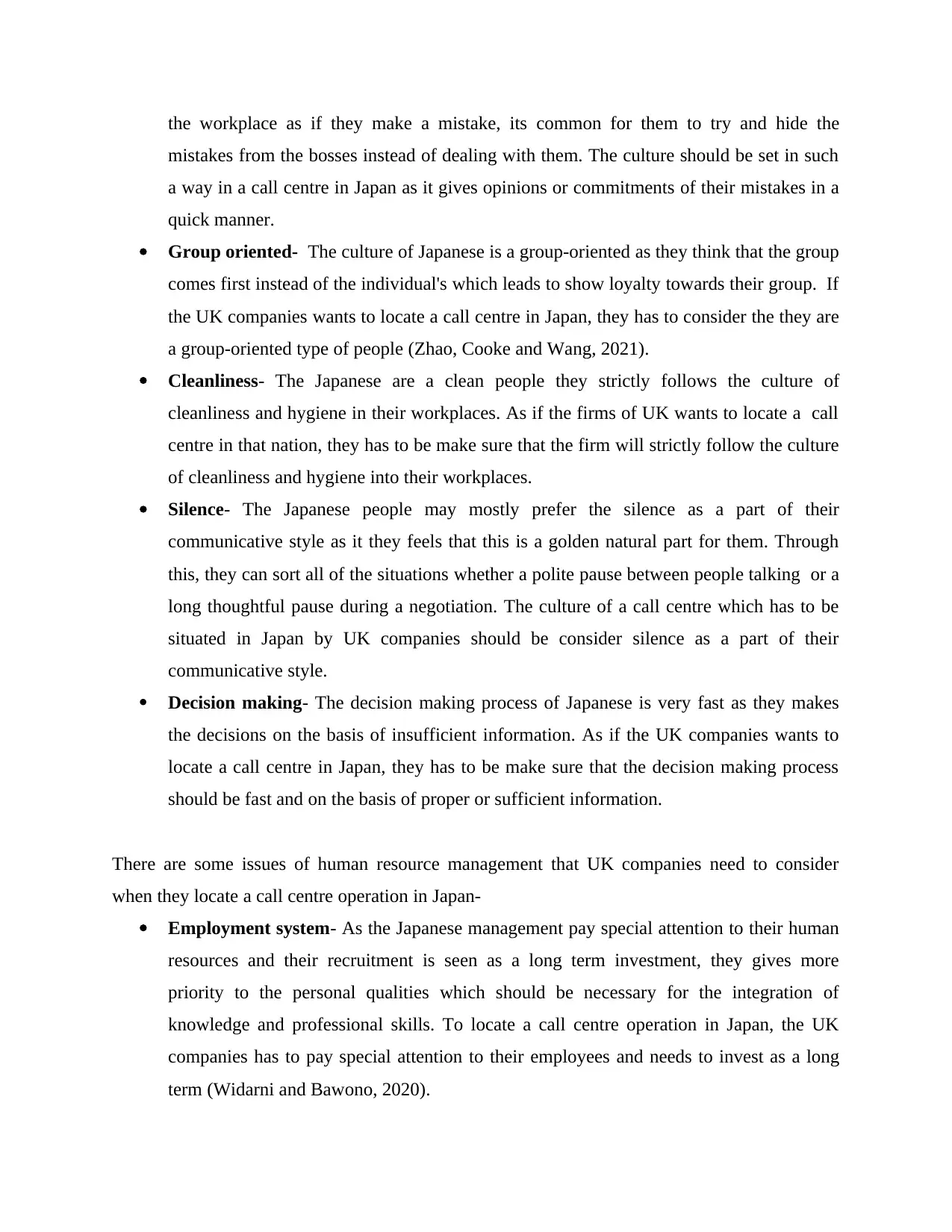
the workplace as if they make a mistake, its common for them to try and hide the
mistakes from the bosses instead of dealing with them. The culture should be set in such
a way in a call centre in Japan as it gives opinions or commitments of their mistakes in a
quick manner.
Group oriented- The culture of Japanese is a group-oriented as they think that the group
comes first instead of the individual's which leads to show loyalty towards their group. If
the UK companies wants to locate a call centre in Japan, they has to consider the they are
a group-oriented type of people (Zhao, Cooke and Wang, 2021).
Cleanliness- The Japanese are a clean people they strictly follows the culture of
cleanliness and hygiene in their workplaces. As if the firms of UK wants to locate a call
centre in that nation, they has to be make sure that the firm will strictly follow the culture
of cleanliness and hygiene into their workplaces.
Silence- The Japanese people may mostly prefer the silence as a part of their
communicative style as it they feels that this is a golden natural part for them. Through
this, they can sort all of the situations whether a polite pause between people talking or a
long thoughtful pause during a negotiation. The culture of a call centre which has to be
situated in Japan by UK companies should be consider silence as a part of their
communicative style.
Decision making- The decision making process of Japanese is very fast as they makes
the decisions on the basis of insufficient information. As if the UK companies wants to
locate a call centre in Japan, they has to be make sure that the decision making process
should be fast and on the basis of proper or sufficient information.
There are some issues of human resource management that UK companies need to consider
when they locate a call centre operation in Japan-
Employment system- As the Japanese management pay special attention to their human
resources and their recruitment is seen as a long term investment, they gives more
priority to the personal qualities which should be necessary for the integration of
knowledge and professional skills. To locate a call centre operation in Japan, the UK
companies has to pay special attention to their employees and needs to invest as a long
term (Widarni and Bawono, 2020).
mistakes from the bosses instead of dealing with them. The culture should be set in such
a way in a call centre in Japan as it gives opinions or commitments of their mistakes in a
quick manner.
Group oriented- The culture of Japanese is a group-oriented as they think that the group
comes first instead of the individual's which leads to show loyalty towards their group. If
the UK companies wants to locate a call centre in Japan, they has to consider the they are
a group-oriented type of people (Zhao, Cooke and Wang, 2021).
Cleanliness- The Japanese are a clean people they strictly follows the culture of
cleanliness and hygiene in their workplaces. As if the firms of UK wants to locate a call
centre in that nation, they has to be make sure that the firm will strictly follow the culture
of cleanliness and hygiene into their workplaces.
Silence- The Japanese people may mostly prefer the silence as a part of their
communicative style as it they feels that this is a golden natural part for them. Through
this, they can sort all of the situations whether a polite pause between people talking or a
long thoughtful pause during a negotiation. The culture of a call centre which has to be
situated in Japan by UK companies should be consider silence as a part of their
communicative style.
Decision making- The decision making process of Japanese is very fast as they makes
the decisions on the basis of insufficient information. As if the UK companies wants to
locate a call centre in Japan, they has to be make sure that the decision making process
should be fast and on the basis of proper or sufficient information.
There are some issues of human resource management that UK companies need to consider
when they locate a call centre operation in Japan-
Employment system- As the Japanese management pay special attention to their human
resources and their recruitment is seen as a long term investment, they gives more
priority to the personal qualities which should be necessary for the integration of
knowledge and professional skills. To locate a call centre operation in Japan, the UK
companies has to pay special attention to their employees and needs to invest as a long
term (Widarni and Bawono, 2020).
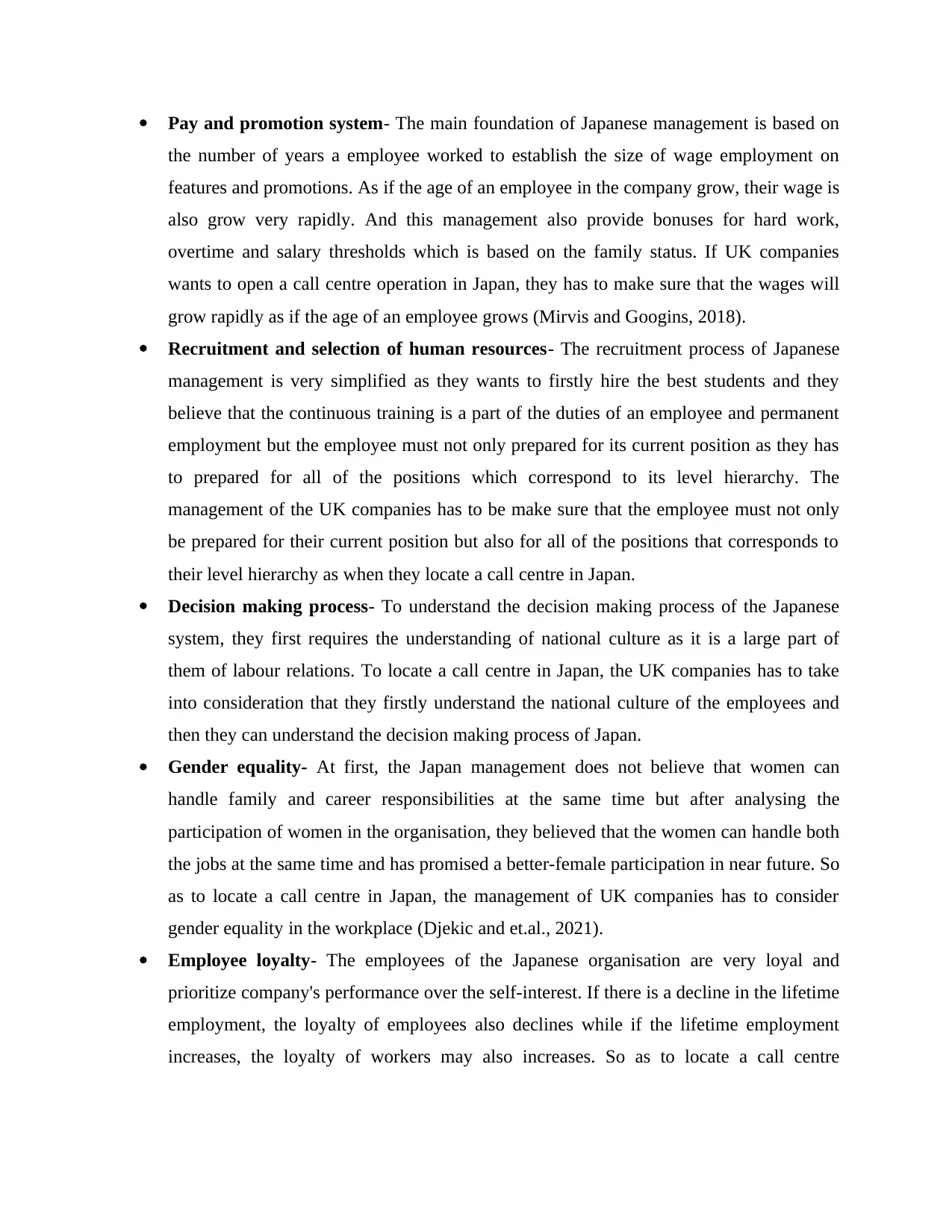
Pay and promotion system- The main foundation of Japanese management is based on
the number of years a employee worked to establish the size of wage employment on
features and promotions. As if the age of an employee in the company grow, their wage is
also grow very rapidly. And this management also provide bonuses for hard work,
overtime and salary thresholds which is based on the family status. If UK companies
wants to open a call centre operation in Japan, they has to make sure that the wages will
grow rapidly as if the age of an employee grows (Mirvis and Googins, 2018).
Recruitment and selection of human resources- The recruitment process of Japanese
management is very simplified as they wants to firstly hire the best students and they
believe that the continuous training is a part of the duties of an employee and permanent
employment but the employee must not only prepared for its current position as they has
to prepared for all of the positions which correspond to its level hierarchy. The
management of the UK companies has to be make sure that the employee must not only
be prepared for their current position but also for all of the positions that corresponds to
their level hierarchy as when they locate a call centre in Japan.
Decision making process- To understand the decision making process of the Japanese
system, they first requires the understanding of national culture as it is a large part of
them of labour relations. To locate a call centre in Japan, the UK companies has to take
into consideration that they firstly understand the national culture of the employees and
then they can understand the decision making process of Japan.
Gender equality- At first, the Japan management does not believe that women can
handle family and career responsibilities at the same time but after analysing the
participation of women in the organisation, they believed that the women can handle both
the jobs at the same time and has promised a better-female participation in near future. So
as to locate a call centre in Japan, the management of UK companies has to consider
gender equality in the workplace (Djekic and et.al., 2021).
Employee loyalty- The employees of the Japanese organisation are very loyal and
prioritize company's performance over the self-interest. If there is a decline in the lifetime
employment, the loyalty of employees also declines while if the lifetime employment
increases, the loyalty of workers may also increases. So as to locate a call centre
the number of years a employee worked to establish the size of wage employment on
features and promotions. As if the age of an employee in the company grow, their wage is
also grow very rapidly. And this management also provide bonuses for hard work,
overtime and salary thresholds which is based on the family status. If UK companies
wants to open a call centre operation in Japan, they has to make sure that the wages will
grow rapidly as if the age of an employee grows (Mirvis and Googins, 2018).
Recruitment and selection of human resources- The recruitment process of Japanese
management is very simplified as they wants to firstly hire the best students and they
believe that the continuous training is a part of the duties of an employee and permanent
employment but the employee must not only prepared for its current position as they has
to prepared for all of the positions which correspond to its level hierarchy. The
management of the UK companies has to be make sure that the employee must not only
be prepared for their current position but also for all of the positions that corresponds to
their level hierarchy as when they locate a call centre in Japan.
Decision making process- To understand the decision making process of the Japanese
system, they first requires the understanding of national culture as it is a large part of
them of labour relations. To locate a call centre in Japan, the UK companies has to take
into consideration that they firstly understand the national culture of the employees and
then they can understand the decision making process of Japan.
Gender equality- At first, the Japan management does not believe that women can
handle family and career responsibilities at the same time but after analysing the
participation of women in the organisation, they believed that the women can handle both
the jobs at the same time and has promised a better-female participation in near future. So
as to locate a call centre in Japan, the management of UK companies has to consider
gender equality in the workplace (Djekic and et.al., 2021).
Employee loyalty- The employees of the Japanese organisation are very loyal and
prioritize company's performance over the self-interest. If there is a decline in the lifetime
employment, the loyalty of employees also declines while if the lifetime employment
increases, the loyalty of workers may also increases. So as to locate a call centre
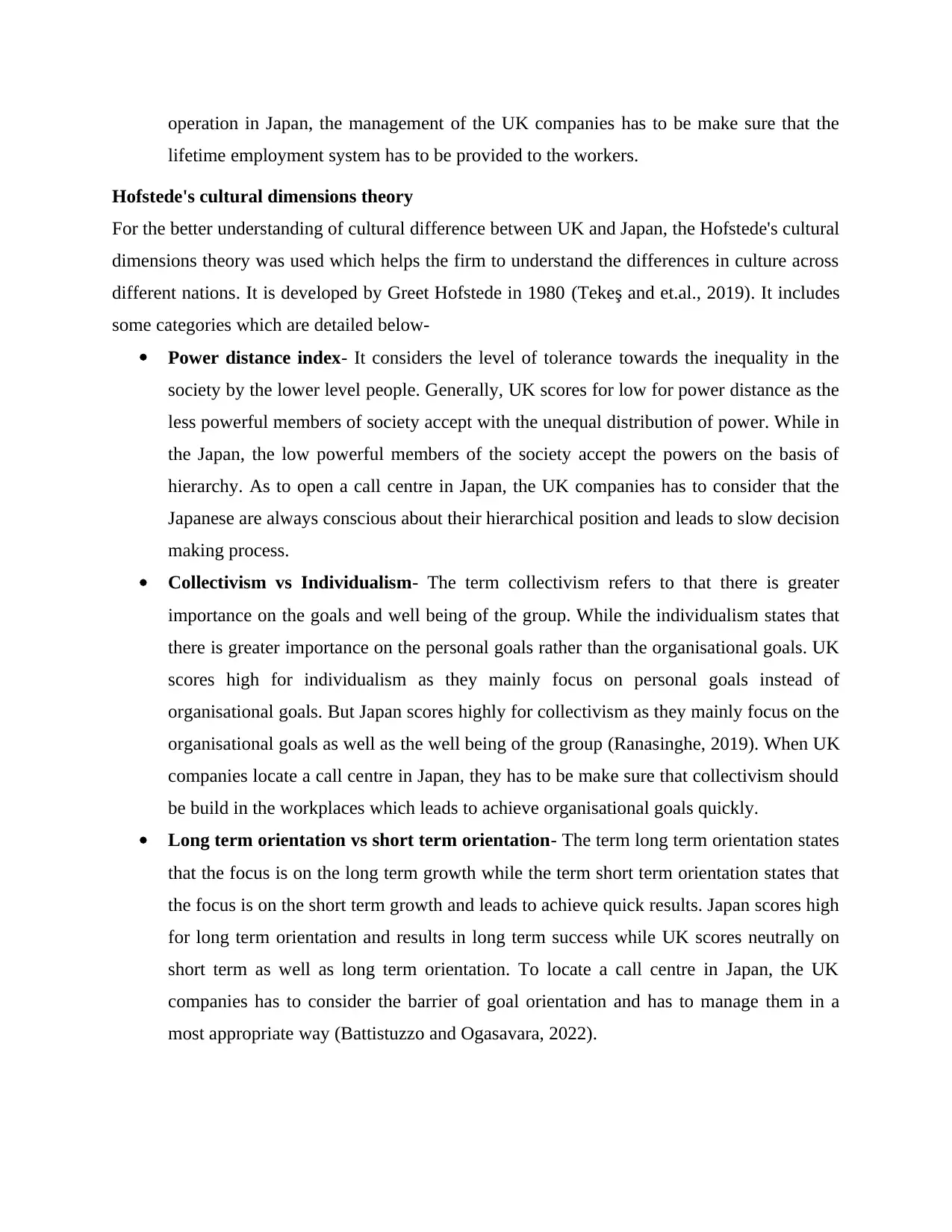
operation in Japan, the management of the UK companies has to be make sure that the
lifetime employment system has to be provided to the workers.
Hofstede's cultural dimensions theory
For the better understanding of cultural difference between UK and Japan, the Hofstede's cultural
dimensions theory was used which helps the firm to understand the differences in culture across
different nations. It is developed by Greet Hofstede in 1980 (Tekeş and et.al., 2019). It includes
some categories which are detailed below-
Power distance index- It considers the level of tolerance towards the inequality in the
society by the lower level people. Generally, UK scores for low for power distance as the
less powerful members of society accept with the unequal distribution of power. While in
the Japan, the low powerful members of the society accept the powers on the basis of
hierarchy. As to open a call centre in Japan, the UK companies has to consider that the
Japanese are always conscious about their hierarchical position and leads to slow decision
making process.
Collectivism vs Individualism- The term collectivism refers to that there is greater
importance on the goals and well being of the group. While the individualism states that
there is greater importance on the personal goals rather than the organisational goals. UK
scores high for individualism as they mainly focus on personal goals instead of
organisational goals. But Japan scores highly for collectivism as they mainly focus on the
organisational goals as well as the well being of the group (Ranasinghe, 2019). When UK
companies locate a call centre in Japan, they has to be make sure that collectivism should
be build in the workplaces which leads to achieve organisational goals quickly.
Long term orientation vs short term orientation- The term long term orientation states
that the focus is on the long term growth while the term short term orientation states that
the focus is on the short term growth and leads to achieve quick results. Japan scores high
for long term orientation and results in long term success while UK scores neutrally on
short term as well as long term orientation. To locate a call centre in Japan, the UK
companies has to consider the barrier of goal orientation and has to manage them in a
most appropriate way (Battistuzzo and Ogasavara, 2022).
lifetime employment system has to be provided to the workers.
Hofstede's cultural dimensions theory
For the better understanding of cultural difference between UK and Japan, the Hofstede's cultural
dimensions theory was used which helps the firm to understand the differences in culture across
different nations. It is developed by Greet Hofstede in 1980 (Tekeş and et.al., 2019). It includes
some categories which are detailed below-
Power distance index- It considers the level of tolerance towards the inequality in the
society by the lower level people. Generally, UK scores for low for power distance as the
less powerful members of society accept with the unequal distribution of power. While in
the Japan, the low powerful members of the society accept the powers on the basis of
hierarchy. As to open a call centre in Japan, the UK companies has to consider that the
Japanese are always conscious about their hierarchical position and leads to slow decision
making process.
Collectivism vs Individualism- The term collectivism refers to that there is greater
importance on the goals and well being of the group. While the individualism states that
there is greater importance on the personal goals rather than the organisational goals. UK
scores high for individualism as they mainly focus on personal goals instead of
organisational goals. But Japan scores highly for collectivism as they mainly focus on the
organisational goals as well as the well being of the group (Ranasinghe, 2019). When UK
companies locate a call centre in Japan, they has to be make sure that collectivism should
be build in the workplaces which leads to achieve organisational goals quickly.
Long term orientation vs short term orientation- The term long term orientation states
that the focus is on the long term growth while the term short term orientation states that
the focus is on the short term growth and leads to achieve quick results. Japan scores high
for long term orientation and results in long term success while UK scores neutrally on
short term as well as long term orientation. To locate a call centre in Japan, the UK
companies has to consider the barrier of goal orientation and has to manage them in a
most appropriate way (Battistuzzo and Ogasavara, 2022).
Paraphrase This Document
Need a fresh take? Get an instant paraphrase of this document with our AI Paraphraser
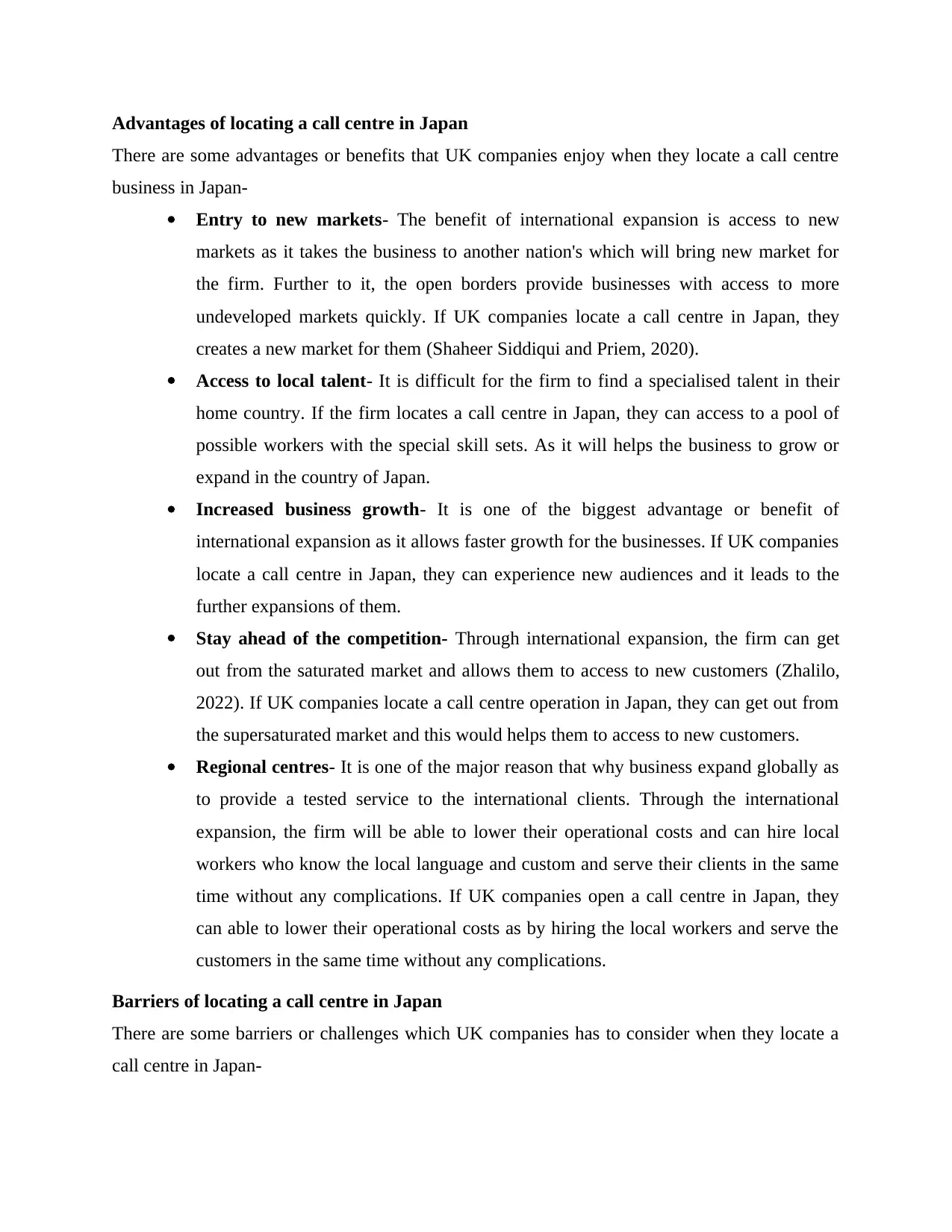
Advantages of locating a call centre in Japan
There are some advantages or benefits that UK companies enjoy when they locate a call centre
business in Japan-
Entry to new markets- The benefit of international expansion is access to new
markets as it takes the business to another nation's which will bring new market for
the firm. Further to it, the open borders provide businesses with access to more
undeveloped markets quickly. If UK companies locate a call centre in Japan, they
creates a new market for them (Shaheer Siddiqui and Priem, 2020).
Access to local talent- It is difficult for the firm to find a specialised talent in their
home country. If the firm locates a call centre in Japan, they can access to a pool of
possible workers with the special skill sets. As it will helps the business to grow or
expand in the country of Japan.
Increased business growth- It is one of the biggest advantage or benefit of
international expansion as it allows faster growth for the businesses. If UK companies
locate a call centre in Japan, they can experience new audiences and it leads to the
further expansions of them.
Stay ahead of the competition- Through international expansion, the firm can get
out from the saturated market and allows them to access to new customers (Zhalilo,
2022). If UK companies locate a call centre operation in Japan, they can get out from
the supersaturated market and this would helps them to access to new customers.
Regional centres- It is one of the major reason that why business expand globally as
to provide a tested service to the international clients. Through the international
expansion, the firm will be able to lower their operational costs and can hire local
workers who know the local language and custom and serve their clients in the same
time without any complications. If UK companies open a call centre in Japan, they
can able to lower their operational costs as by hiring the local workers and serve the
customers in the same time without any complications.
Barriers of locating a call centre in Japan
There are some barriers or challenges which UK companies has to consider when they locate a
call centre in Japan-
There are some advantages or benefits that UK companies enjoy when they locate a call centre
business in Japan-
Entry to new markets- The benefit of international expansion is access to new
markets as it takes the business to another nation's which will bring new market for
the firm. Further to it, the open borders provide businesses with access to more
undeveloped markets quickly. If UK companies locate a call centre in Japan, they
creates a new market for them (Shaheer Siddiqui and Priem, 2020).
Access to local talent- It is difficult for the firm to find a specialised talent in their
home country. If the firm locates a call centre in Japan, they can access to a pool of
possible workers with the special skill sets. As it will helps the business to grow or
expand in the country of Japan.
Increased business growth- It is one of the biggest advantage or benefit of
international expansion as it allows faster growth for the businesses. If UK companies
locate a call centre in Japan, they can experience new audiences and it leads to the
further expansions of them.
Stay ahead of the competition- Through international expansion, the firm can get
out from the saturated market and allows them to access to new customers (Zhalilo,
2022). If UK companies locate a call centre operation in Japan, they can get out from
the supersaturated market and this would helps them to access to new customers.
Regional centres- It is one of the major reason that why business expand globally as
to provide a tested service to the international clients. Through the international
expansion, the firm will be able to lower their operational costs and can hire local
workers who know the local language and custom and serve their clients in the same
time without any complications. If UK companies open a call centre in Japan, they
can able to lower their operational costs as by hiring the local workers and serve the
customers in the same time without any complications.
Barriers of locating a call centre in Japan
There are some barriers or challenges which UK companies has to consider when they locate a
call centre in Japan-
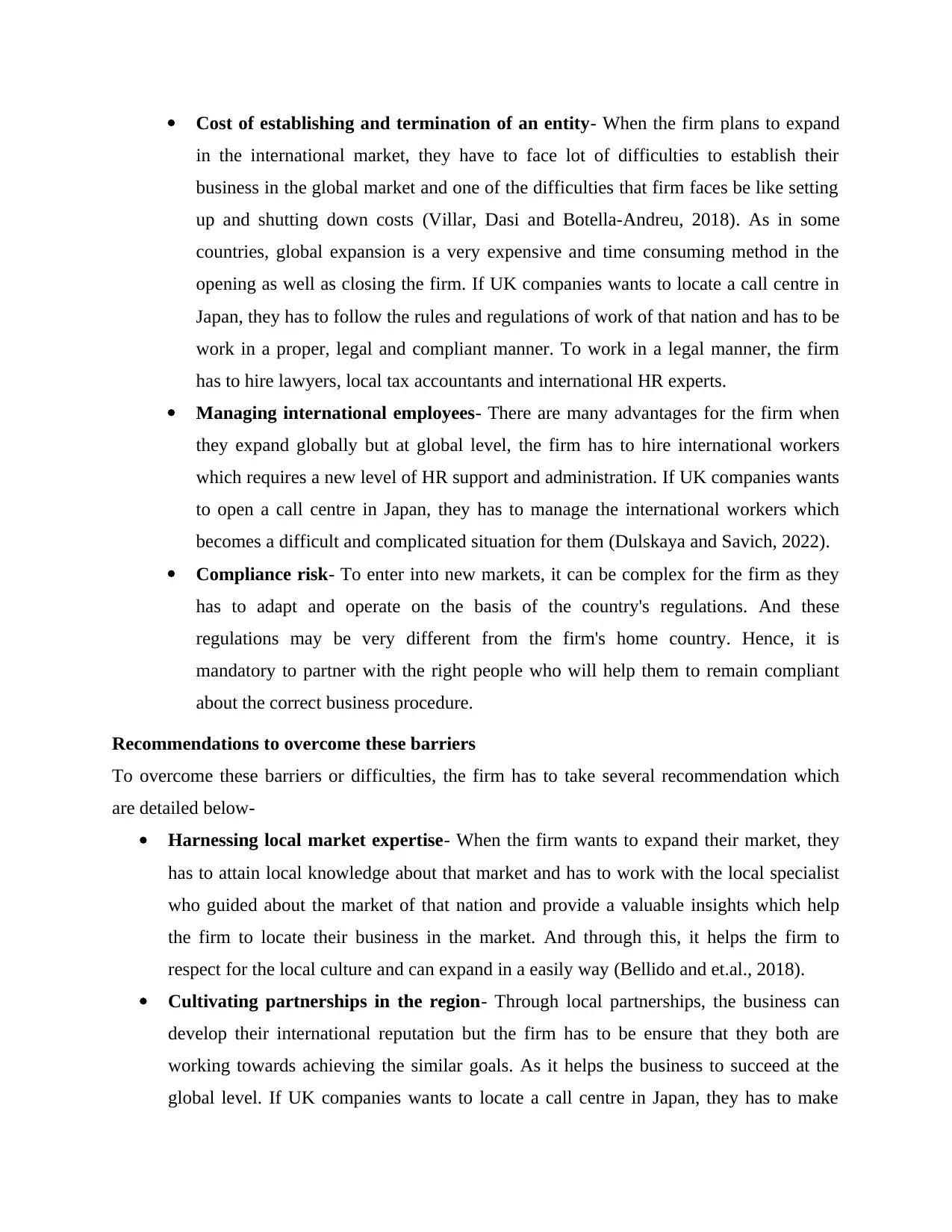
Cost of establishing and termination of an entity- When the firm plans to expand
in the international market, they have to face lot of difficulties to establish their
business in the global market and one of the difficulties that firm faces be like setting
up and shutting down costs (Villar, Dasi and Botella-Andreu, 2018). As in some
countries, global expansion is a very expensive and time consuming method in the
opening as well as closing the firm. If UK companies wants to locate a call centre in
Japan, they has to follow the rules and regulations of work of that nation and has to be
work in a proper, legal and compliant manner. To work in a legal manner, the firm
has to hire lawyers, local tax accountants and international HR experts.
Managing international employees- There are many advantages for the firm when
they expand globally but at global level, the firm has to hire international workers
which requires a new level of HR support and administration. If UK companies wants
to open a call centre in Japan, they has to manage the international workers which
becomes a difficult and complicated situation for them (Dulskaya and Savich, 2022).
Compliance risk- To enter into new markets, it can be complex for the firm as they
has to adapt and operate on the basis of the country's regulations. And these
regulations may be very different from the firm's home country. Hence, it is
mandatory to partner with the right people who will help them to remain compliant
about the correct business procedure.
Recommendations to overcome these barriers
To overcome these barriers or difficulties, the firm has to take several recommendation which
are detailed below-
Harnessing local market expertise- When the firm wants to expand their market, they
has to attain local knowledge about that market and has to work with the local specialist
who guided about the market of that nation and provide a valuable insights which help
the firm to locate their business in the market. And through this, it helps the firm to
respect for the local culture and can expand in a easily way (Bellido and et.al., 2018).
Cultivating partnerships in the region- Through local partnerships, the business can
develop their international reputation but the firm has to be ensure that they both are
working towards achieving the similar goals. As it helps the business to succeed at the
global level. If UK companies wants to locate a call centre in Japan, they has to make
in the international market, they have to face lot of difficulties to establish their
business in the global market and one of the difficulties that firm faces be like setting
up and shutting down costs (Villar, Dasi and Botella-Andreu, 2018). As in some
countries, global expansion is a very expensive and time consuming method in the
opening as well as closing the firm. If UK companies wants to locate a call centre in
Japan, they has to follow the rules and regulations of work of that nation and has to be
work in a proper, legal and compliant manner. To work in a legal manner, the firm
has to hire lawyers, local tax accountants and international HR experts.
Managing international employees- There are many advantages for the firm when
they expand globally but at global level, the firm has to hire international workers
which requires a new level of HR support and administration. If UK companies wants
to open a call centre in Japan, they has to manage the international workers which
becomes a difficult and complicated situation for them (Dulskaya and Savich, 2022).
Compliance risk- To enter into new markets, it can be complex for the firm as they
has to adapt and operate on the basis of the country's regulations. And these
regulations may be very different from the firm's home country. Hence, it is
mandatory to partner with the right people who will help them to remain compliant
about the correct business procedure.
Recommendations to overcome these barriers
To overcome these barriers or difficulties, the firm has to take several recommendation which
are detailed below-
Harnessing local market expertise- When the firm wants to expand their market, they
has to attain local knowledge about that market and has to work with the local specialist
who guided about the market of that nation and provide a valuable insights which help
the firm to locate their business in the market. And through this, it helps the firm to
respect for the local culture and can expand in a easily way (Bellido and et.al., 2018).
Cultivating partnerships in the region- Through local partnerships, the business can
develop their international reputation but the firm has to be ensure that they both are
working towards achieving the similar goals. As it helps the business to succeed at the
global level. If UK companies wants to locate a call centre in Japan, they has to make
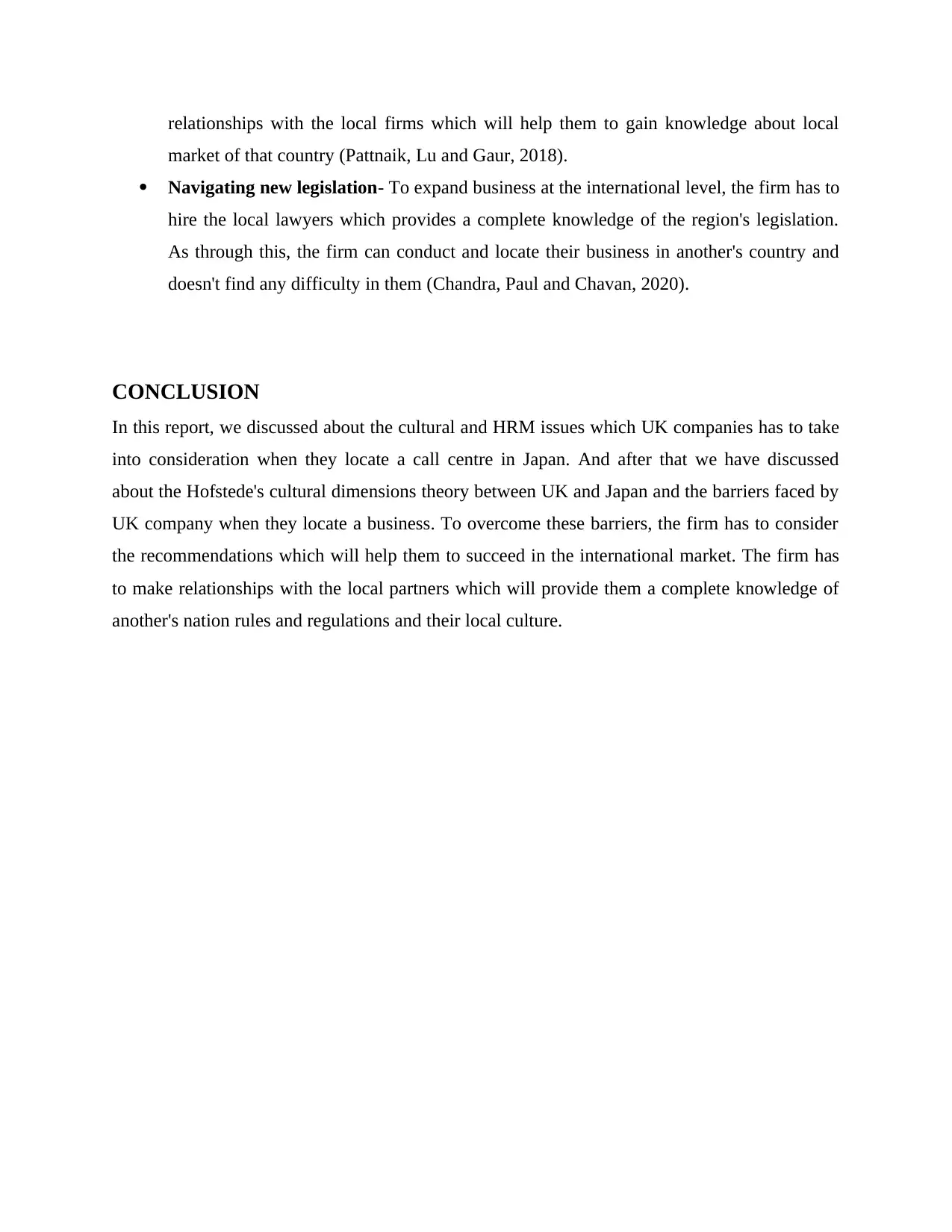
relationships with the local firms which will help them to gain knowledge about local
market of that country (Pattnaik, Lu and Gaur, 2018).
Navigating new legislation- To expand business at the international level, the firm has to
hire the local lawyers which provides a complete knowledge of the region's legislation.
As through this, the firm can conduct and locate their business in another's country and
doesn't find any difficulty in them (Chandra, Paul and Chavan, 2020).
CONCLUSION
In this report, we discussed about the cultural and HRM issues which UK companies has to take
into consideration when they locate a call centre in Japan. And after that we have discussed
about the Hofstede's cultural dimensions theory between UK and Japan and the barriers faced by
UK company when they locate a business. To overcome these barriers, the firm has to consider
the recommendations which will help them to succeed in the international market. The firm has
to make relationships with the local partners which will provide them a complete knowledge of
another's nation rules and regulations and their local culture.
market of that country (Pattnaik, Lu and Gaur, 2018).
Navigating new legislation- To expand business at the international level, the firm has to
hire the local lawyers which provides a complete knowledge of the region's legislation.
As through this, the firm can conduct and locate their business in another's country and
doesn't find any difficulty in them (Chandra, Paul and Chavan, 2020).
CONCLUSION
In this report, we discussed about the cultural and HRM issues which UK companies has to take
into consideration when they locate a call centre in Japan. And after that we have discussed
about the Hofstede's cultural dimensions theory between UK and Japan and the barriers faced by
UK company when they locate a business. To overcome these barriers, the firm has to consider
the recommendations which will help them to succeed in the international market. The firm has
to make relationships with the local partners which will provide them a complete knowledge of
another's nation rules and regulations and their local culture.
Secure Best Marks with AI Grader
Need help grading? Try our AI Grader for instant feedback on your assignments.
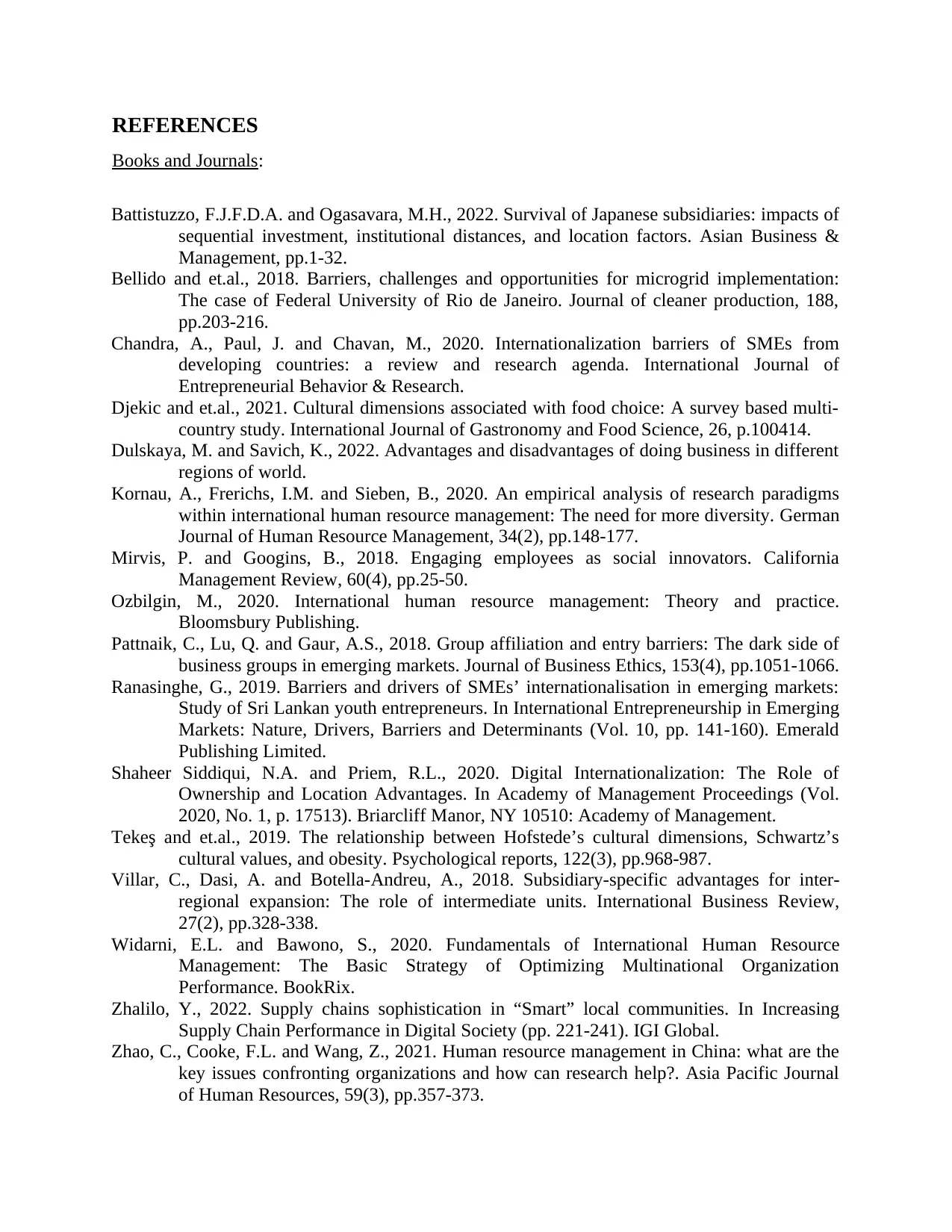
REFERENCES
Books and Journals:
Battistuzzo, F.J.F.D.A. and Ogasavara, M.H., 2022. Survival of Japanese subsidiaries: impacts of
sequential investment, institutional distances, and location factors. Asian Business &
Management, pp.1-32.
Bellido and et.al., 2018. Barriers, challenges and opportunities for microgrid implementation:
The case of Federal University of Rio de Janeiro. Journal of cleaner production, 188,
pp.203-216.
Chandra, A., Paul, J. and Chavan, M., 2020. Internationalization barriers of SMEs from
developing countries: a review and research agenda. International Journal of
Entrepreneurial Behavior & Research.
Djekic and et.al., 2021. Cultural dimensions associated with food choice: A survey based multi-
country study. International Journal of Gastronomy and Food Science, 26, p.100414.
Dulskaya, M. and Savich, K., 2022. Advantages and disadvantages of doing business in different
regions of world.
Kornau, A., Frerichs, I.M. and Sieben, B., 2020. An empirical analysis of research paradigms
within international human resource management: The need for more diversity. German
Journal of Human Resource Management, 34(2), pp.148-177.
Mirvis, P. and Googins, B., 2018. Engaging employees as social innovators. California
Management Review, 60(4), pp.25-50.
Ozbilgin, M., 2020. International human resource management: Theory and practice.
Bloomsbury Publishing.
Pattnaik, C., Lu, Q. and Gaur, A.S., 2018. Group affiliation and entry barriers: The dark side of
business groups in emerging markets. Journal of Business Ethics, 153(4), pp.1051-1066.
Ranasinghe, G., 2019. Barriers and drivers of SMEs’ internationalisation in emerging markets:
Study of Sri Lankan youth entrepreneurs. In International Entrepreneurship in Emerging
Markets: Nature, Drivers, Barriers and Determinants (Vol. 10, pp. 141-160). Emerald
Publishing Limited.
Shaheer Siddiqui, N.A. and Priem, R.L., 2020. Digital Internationalization: The Role of
Ownership and Location Advantages. In Academy of Management Proceedings (Vol.
2020, No. 1, p. 17513). Briarcliff Manor, NY 10510: Academy of Management.
Tekeş and et.al., 2019. The relationship between Hofstede’s cultural dimensions, Schwartz’s
cultural values, and obesity. Psychological reports, 122(3), pp.968-987.
Villar, C., Dasi, A. and Botella-Andreu, A., 2018. Subsidiary-specific advantages for inter-
regional expansion: The role of intermediate units. International Business Review,
27(2), pp.328-338.
Widarni, E.L. and Bawono, S., 2020. Fundamentals of International Human Resource
Management: The Basic Strategy of Optimizing Multinational Organization
Performance. BookRix.
Zhalilo, Y., 2022. Supply chains sophistication in “Smart” local communities. In Increasing
Supply Chain Performance in Digital Society (pp. 221-241). IGI Global.
Zhao, C., Cooke, F.L. and Wang, Z., 2021. Human resource management in China: what are the
key issues confronting organizations and how can research help?. Asia Pacific Journal
of Human Resources, 59(3), pp.357-373.
Books and Journals:
Battistuzzo, F.J.F.D.A. and Ogasavara, M.H., 2022. Survival of Japanese subsidiaries: impacts of
sequential investment, institutional distances, and location factors. Asian Business &
Management, pp.1-32.
Bellido and et.al., 2018. Barriers, challenges and opportunities for microgrid implementation:
The case of Federal University of Rio de Janeiro. Journal of cleaner production, 188,
pp.203-216.
Chandra, A., Paul, J. and Chavan, M., 2020. Internationalization barriers of SMEs from
developing countries: a review and research agenda. International Journal of
Entrepreneurial Behavior & Research.
Djekic and et.al., 2021. Cultural dimensions associated with food choice: A survey based multi-
country study. International Journal of Gastronomy and Food Science, 26, p.100414.
Dulskaya, M. and Savich, K., 2022. Advantages and disadvantages of doing business in different
regions of world.
Kornau, A., Frerichs, I.M. and Sieben, B., 2020. An empirical analysis of research paradigms
within international human resource management: The need for more diversity. German
Journal of Human Resource Management, 34(2), pp.148-177.
Mirvis, P. and Googins, B., 2018. Engaging employees as social innovators. California
Management Review, 60(4), pp.25-50.
Ozbilgin, M., 2020. International human resource management: Theory and practice.
Bloomsbury Publishing.
Pattnaik, C., Lu, Q. and Gaur, A.S., 2018. Group affiliation and entry barriers: The dark side of
business groups in emerging markets. Journal of Business Ethics, 153(4), pp.1051-1066.
Ranasinghe, G., 2019. Barriers and drivers of SMEs’ internationalisation in emerging markets:
Study of Sri Lankan youth entrepreneurs. In International Entrepreneurship in Emerging
Markets: Nature, Drivers, Barriers and Determinants (Vol. 10, pp. 141-160). Emerald
Publishing Limited.
Shaheer Siddiqui, N.A. and Priem, R.L., 2020. Digital Internationalization: The Role of
Ownership and Location Advantages. In Academy of Management Proceedings (Vol.
2020, No. 1, p. 17513). Briarcliff Manor, NY 10510: Academy of Management.
Tekeş and et.al., 2019. The relationship between Hofstede’s cultural dimensions, Schwartz’s
cultural values, and obesity. Psychological reports, 122(3), pp.968-987.
Villar, C., Dasi, A. and Botella-Andreu, A., 2018. Subsidiary-specific advantages for inter-
regional expansion: The role of intermediate units. International Business Review,
27(2), pp.328-338.
Widarni, E.L. and Bawono, S., 2020. Fundamentals of International Human Resource
Management: The Basic Strategy of Optimizing Multinational Organization
Performance. BookRix.
Zhalilo, Y., 2022. Supply chains sophistication in “Smart” local communities. In Increasing
Supply Chain Performance in Digital Society (pp. 221-241). IGI Global.
Zhao, C., Cooke, F.L. and Wang, Z., 2021. Human resource management in China: what are the
key issues confronting organizations and how can research help?. Asia Pacific Journal
of Human Resources, 59(3), pp.357-373.
1 out of 11
Related Documents
Your All-in-One AI-Powered Toolkit for Academic Success.
+13062052269
info@desklib.com
Available 24*7 on WhatsApp / Email
![[object Object]](/_next/static/media/star-bottom.7253800d.svg)
Unlock your academic potential
© 2024 | Zucol Services PVT LTD | All rights reserved.




